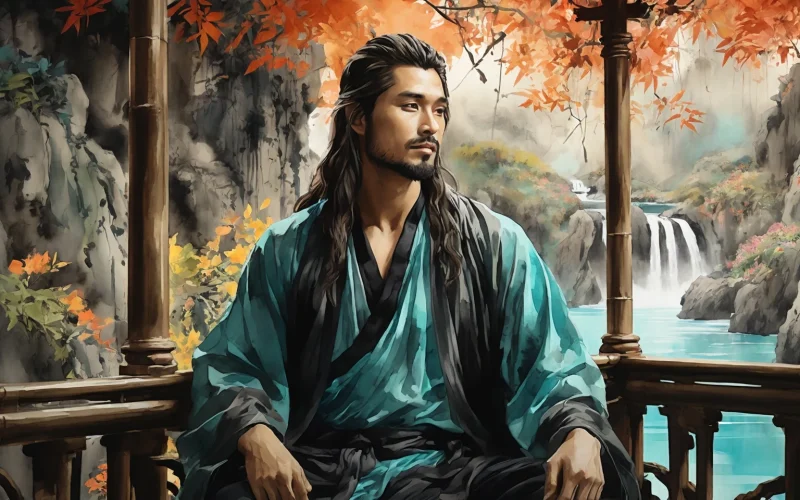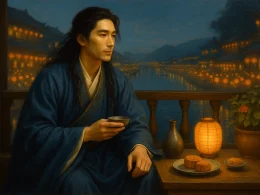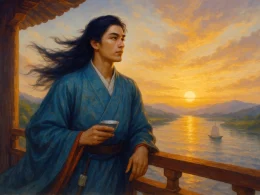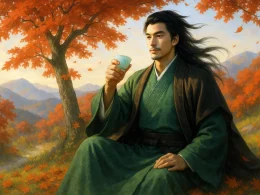Ouyang Xiu (1007 - 1072), a native of Jizhou, Jiangxi, was a leading figure in the literary world of the Northern Song Dynasty. He attained the jinshi degree in 1030 and rose to the position of Vice Grand Councilor, posthumously honored with the title "Wenzhong" (Cultured and Loyal). He directed the compilation of the New Book of Tang and the New History of the Five Dynasties and championed literary reform, opposing the ornate style of the Xikun School. His prose works, such as The Pavilion of the Drunken Old Man and The Sound of Autumn, pioneered the literary style of the Song Dynasty. His poetry, characterized by its simplicity and fluency, includes Playfully Replying to Yuan Zhen, where the line "I doubt the spring wind ever reaches this faraway place" reflects his state of mind in exile. His lyric poetry, graceful and profound, features classics like Treading on Grass with the line "Beyond the vast plain lie spring-green hills," which became an enduring expression of parting sorrow. He mentored literary giants such as Su Shi and Zeng Gong, laying the foundation for the golden age of Northern Song literature, and is honored as one of the "Eight Great Prose Masters of the Tang and Song Dynasties."
Major Works
Life and Career
Early Years
Born in 1007 in Mianzhou (modern Sichuan Province) during Emperor Zhenzong's reign, Ouyang Xiu came from a modest bureaucratic family with roots in Luling (present-day Ji'an, Jiangxi). His father Ouyang Guan, a low-ranking military official known for his integrity, died when the boy was only four. This left his mother Lady Zheng to raise him in poverty at her brother-in-law's home in Suizhou (Hubei Province), where she famously taught him to write by tracing characters with a reed stalk in sand—an episode immortalized in Chinese pedagogical lore and later movingly recounted in his "Epitaph for My Parents at Longgang."
The precocious youth mastered Confucian classics by age ten and had a formative intellectual encounter when discovering a damaged copy of Han Yu's collected works in a neighbor's library. This exposure to the Tang dynasty literary reformer profoundly influenced his future cultural mission. In 1029, his essay "On the Zuo Commentary's Exaggerations" impressed examination officials, leading to his meteoric success in the imperial examinations—placing first in preliminary tests before achieving the prestigious jinshi degree in 1030 (14th overall), ironically sharing the honor with his future political rival Wang Gongchen.
Career and Struggles
His official career began as a judicial officer in Luoyang, where he formed lasting friendships with intellectuals like Yin Zhu and Mei Yaochen, collectively rejecting the ornate "Xikun Style" in favor of Han Yu's classical prose. In 1036, his defense of the reformist Fan Zhongyan against imperial censors resulted in a fiery "Letter to Censor Gao"—denouncing the official as "shameless"—and subsequent banishment as county magistrate of Yiling (Hubei). This exile proved intellectually fertile; his travel diary "Account of My Journey" pioneered a new form of observational writing.
Recalled to court in 1043 during Fan Zhongyan's Qingli Reforms, Ouyang served as Reminder of the Right and penned the seminal "On Factions," arguing that virtuous officials could properly form political alliances. When conservatives crushed the reforms, fabricated charges of incest with his niece saw him exiled again—this time to Chuzhou (Anhui), where he composed the timeless "Record of the Old Drunkard's Pavilion." The work's famous line "The old drunkard's heart resides not in wine, but in mountains and streams" became an enduring symbol of scholarly resilience.
After provincial postings in Yangzhou, Yingzhou, and Nanjing (Henan), he returned to central government as Academician, Military Commissioner, and finally Vice Grand Councilor (1061-67). His governance philosophy emphasized pragmatism over formalism, while his 1057 examination reforms—rejecting obscure writing styles—discovered talents like Su Shi and Su Zhe, shaping Song intellectual life for generations.
Literary Achievements
Ouyang's "Original Meanings of the Classic of Poetry" challenged Han dynasty exegesis by interpreting odes through human sentiment, arguing many folk songs expressed romantic love. Similarly radical, "A Child's Questions on the Changes" disputed Confucius's authorship of appendices to the I Ching, exemplifying Song critical scholarship.
His 18-year project "Collection of Antiquities" (Jigulu) pioneered epigraphic studies, using 1,000+ stone inscriptions to verify historical texts—like employing a Tang salt administration stele to reconstruct economic history. Qing philologist Qian Daxin later hailed him as "father of Chinese epigraphy."
Retiring in 1071 as "Retired Scholar of Six Ones" (referencing his library, artifacts, and wine), he spent final years in Yingzhou opposing Wang Anshi's reforms. His last memorial criticized the Green Sprouts policy before his 1072 death at 66, posthumously honored as "Cultured and Loyal."
Artistic Style
Poetic Style
- Fresh Naturalness with Profound Imagery: Ouyang Xiu's poetry inherited and developed the Tang poetic tradition, emphasizing the creation of evocative atmospheres and emotional expression. His language is simple yet refined, skillfully blending scene and sentiment to create vivid imagery and lingering resonance.
- Boldness Interwoven with Delicacy: His verses alternate between heroic passion and subtle melancholy, demonstrating remarkable artistic versatility. For instance, in "Autumn Sounds Fu", he depicts autumn's harshness with powerful diction, while his nostalgic or introspective poems adopt a gentler, more intimate tone.
- Social Consciousness and Temporal Reflections: Living during the Northern Song's social transformations, Ouyang infused his poetry with historical responsibility. His works reveal concerns about national destiny, societal changes, and personal circumstances. Pieces like "Autumn Sounds Fu" and "Butterflies in Love with Flowers" (How Deeply, Deeply Walled the Garden) combine natural descriptions with philosophical musings on life's impermanence.
Lyrical (Ci) Features
- Pioneer of the Wanyue (Graceful and Restrained) School: Ouyang Xiu was a foundational figure of the Song wanyue lyrical style. His ci poems employ accessible yet elegant language to authentically express themes of separation, existential contemplation, and tender melancholy.
- Unadorned Elegance and Emotional Authenticity: Rejecting artificial ornamentation, his ci prioritize genuine emotional expression. Through deceptively simple diction, he captures the soul's most complex nuances, frequently revisiting nostalgic memories, longing for homeland, or meditating on life's transience.
- Musical Fluidity and Rhythmic Mastery: Ouyang's ci exhibit exceptional rhythmic sophistication, with natural cadences that enhance their singability. This musicality established enduring standards for the wanyue style, earning widespread admiration from later poets.
Legacy
Spanning three reigns, Ouyang epitomized the scholar-statesman ideal—mentoring the Su brothers and Zeng Gong while redefining literati culture. Su Shi's evaluation positioned him as "Han Yu in philosophy, Lu Zhi in statecraft, Sima Qian in historiography, and Li Bai in poetry." Yuan Haowen's verse "After a century, ancient style revived/ Yuanyou masters followed his lead" acknowledges his pivotal role in China's intellectual history.
Modern scholar Yu Yingshi notes Ouyang realized Confucian "inner sageliness and outer kingliness," balancing scholarship with governance. In 2019, the IAU named a Mercury crater after him, testament to his global legacy as architect of Song cultural renaissance.












































